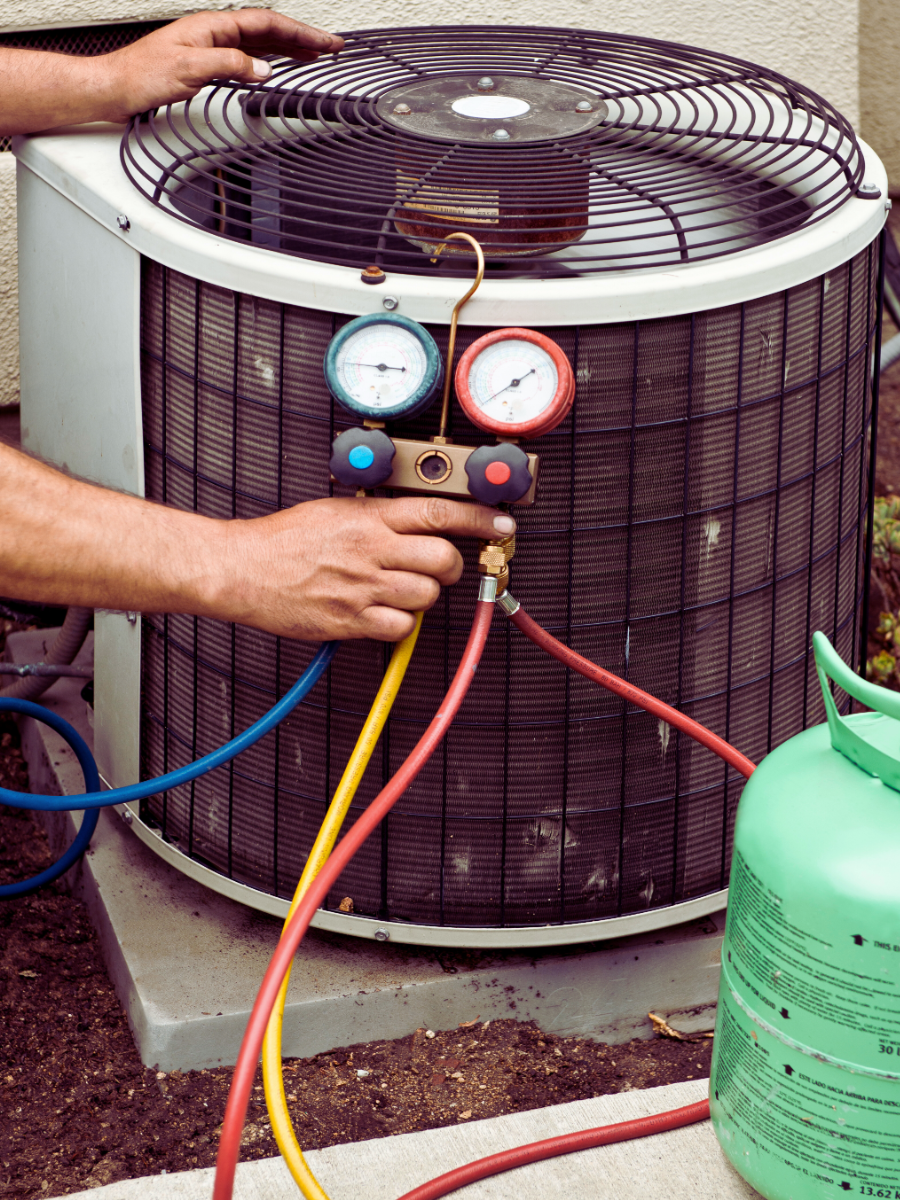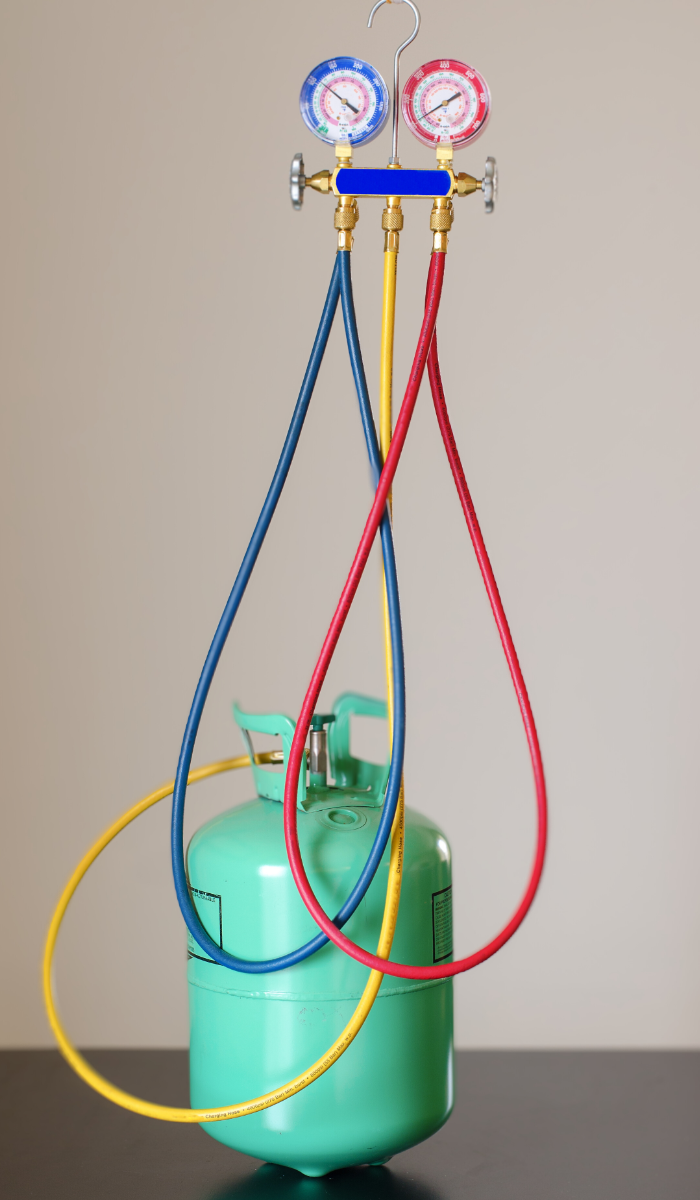 Heat pumps need refrigerant to cool your home. Those made before 2010 work with Freon (R-22). Those made after this time period work with a less harmful type, like R-410A. The government banned the production and import of R-22 because it’s bad for the environment.
Heat pumps need refrigerant to cool your home. Those made before 2010 work with Freon (R-22). Those made after this time period work with a less harmful type, like R-410A. The government banned the production and import of R-22 because it’s bad for the environment.
So while the answer is technically “yes,” most HVAC systems made today don’t use Freon anymore—they use a more modern refrigerant.
Key Takeaways
- Heat pumps do use refrigerant
- Freon is no longer allowed in the United States
- Leaks and wear can cause refrigerant loss
- Signs of low refrigerant
- DIY refrigerant recharge is never recommended
Why Freon (Refrigerant) Is Essential for Heat Pumps
Your climate control system cannot function without refrigerant. The unique fluid is responsible for transferring heat from one location to another. In the winter, it will bring heat into your house, and in the summer, it will remove heat from your home.
Here’s a simple way to think of it:
– In heating mode, refrigerant collects heat from the outdoor air and brings it inside.
– In cooling mode, it takes the heat from your indoor air and dumps it outside.
The refrigerant undergoes a reversible transformation from a liquid to a gas as it circulates through a closed circuit of coils. It is via these variations in temperature and pressure that your HVAC is able to transport heat.
What Causes a Heat Pump to Lose Refrigerant?
In an ideal world, HVAC systems would never need to have their refrigerant refilled since they are sealed systems. The problem is that refrigerant can seep out for a few different reasons:
- Refrigerant leaks: This the most common reason HVAC systems lose Freon or refrigerant. Leaks can happen in the coils, fittings or joints, especially in older systems. Small leaks tend to go unnoticed for extended periods of time, but they make the HVAC less effective and efficient.
- Factory defects or poor installation: If the pump has a manufacturing flaw or doesn’t get installed properly, it can leak. This is why it’s so important to have a trusted expert do the installation for you.
- Wear and tear over time: Over the years, the pump will experience vibrations, corrosion and constant pressure. These factors will wear down the parts, potentially causing cracks or holes in the refrigerant line. If not repaired immediately, the refrigerant will leak out.
Signs Your Heat Pump Is Low on Freon
 If you think your HVAC might have a leak, you can watch for several warning signs:
If you think your HVAC might have a leak, you can watch for several warning signs:
- Uneven temperatures: A refrigerant leak reduces the system’s ability to transfer heat, causing inconsistent temperatures throughout the home.
- Ice on the refrigerant lines: Low refrigerant levels cause evaporator coils to get too cold, leading to ice buildup.
- Higher energy bills: A system low on refrigerant has to work harder to keep your home comfortable, which uses more electricity.
- Water leaking around the indoor part: Ice from the coils can melt and overflow the drain pan.
- A bubbling or hissing noise: These sounds often indicate refrigerant escaping through a crack or hole in the line.
How Often to Refill Refrigerant
Here’s something most people don’t realize: You should never have to refill the refrigerant in your HVAC. When all components are functioning as they should, the refrigerant simply cycles through the system again and again.
If you find yourself having to refill the refrigerant each year, this means there’s a leak somewhere. Finding and fixing the leak will be much more cost-effective and convenient than refilling the refrigerant over and over.
Can You Recharge a Heat Pump Yourself?
It’s never a good idea to recharge an HVAC unit yourself, and here’s why:
- It’s not safe: Refrigerants are pressurized chemicals. They can easily cause burn injuries, breathing problems and other hazards if you don’t handle them correctly.
- It’s illegal without certification: You must have proper certification to work with refrigerants in the United States, and this includes refilling HVAC systems.
- You risk damaging the system: If you add too little refrigerant, it can cause the system to overheat and reduce its efficiency. If you add too much, it will increase the pressure and damage the compressor.
Contact One Hour Pensacola for Heat Pump Maintenance
 Call One Hour Pensacola if you suspect a low refrigerant level in your HVAC system. Our trained and certified HVAC technicians can:
Call One Hour Pensacola if you suspect a low refrigerant level in your HVAC system. Our trained and certified HVAC technicians can:
- Find refrigerant leaks
- Safely repair your system
- Recharge your refrigerant properly
- Perform routine maintenance to keep your system running smoothly
No matter the season, we make it simple to maintain a warm or cool home. We are experts in handling any system, whether it’s an older one using Freon or a newer one using R-410A.
Schedule an inspection or maintenance appointment now by calling One Hour Pensacola. We’re always on time or you don’t pay a dime.